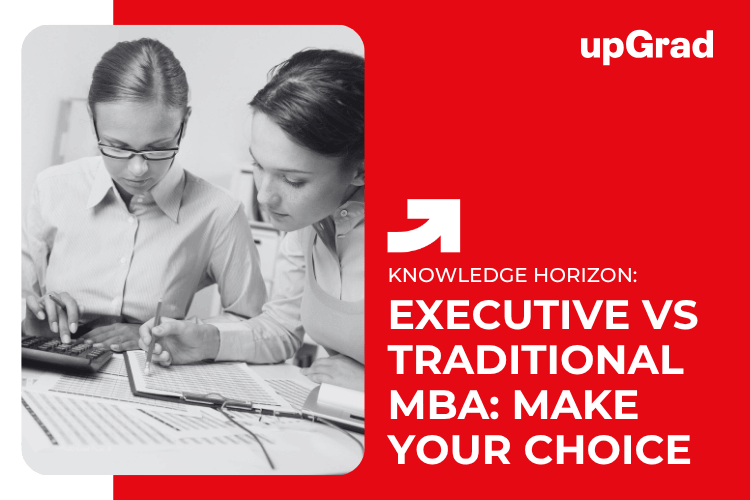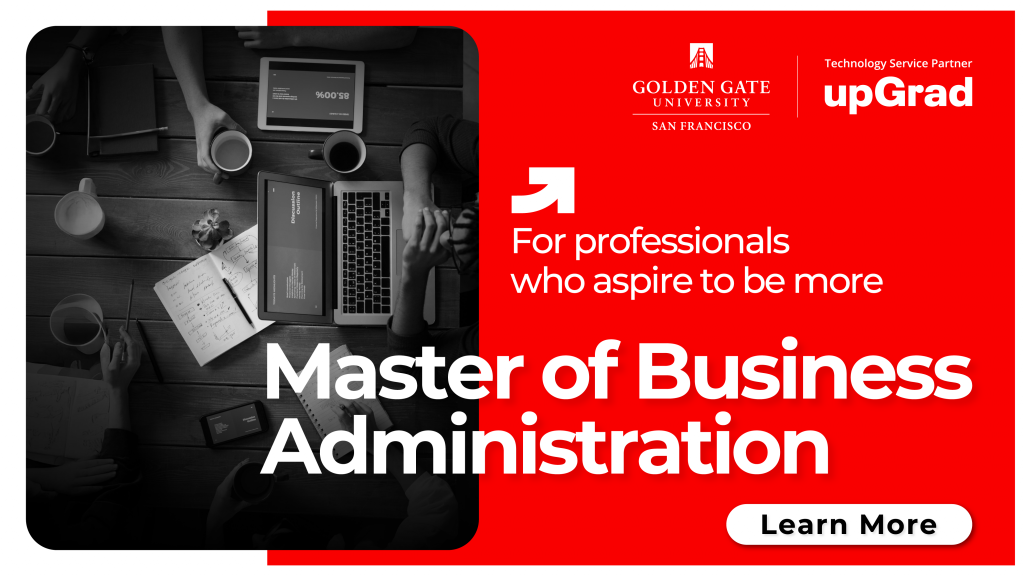An MBA is one of the most popular degree programs across the globe. Its widespread popularity lies in its ability to help individuals develop leadership skills and empower them to succeed across diverse fields. However, when it comes to pursuing an MBA program in Singapore, students often query about the differences between an executive MBA vs. traditional MBA. This article will help you learn more about the differences between these two MBA programs in Singapore and decide which one aligns best with your career objectives and preferences.
Understanding Executive and Traditional MBA Programs
Before delving into the differences between Executive MBA vs. traditional MBA, let’s understand the details of each of the programs.
Executive MBA
- The executive MBA program, also known as the EMBA program, is meant for students with a minimum of 5-6 years of work experience and who want to continue working full-time while pursuing the MBA program.
- The main goal of this program is to help the students develop advanced strategic abilities to enhance their leadership skills and take the next steps in their careers.
- Although the schedule of this program often varies, the majority of the institutes offer part-time formats like weekend classes.
- After completing this course, the students can earn the same degree as traditional MBA students.
Traditional MBA
- A traditional MBA program or a full-time MBA program is a full-time and highly esteemed academic program designed for ambitious recent graduates or candidates with 2-3 years of work experience.
- In this course, the students can learn how to adapt to, lead, and manage different types of business environments successfully. Besides, this program helps the students develop all the necessary skills required for developing a career in business and management.
- Traditional MBA students typically take a career break to fully immerse themselves in the B-school experience, including academics and internship opportunities.
- After completing this program, the students can have diverse career scopes in different industries like technology, finance, or consulting.
MBA vs. EMBA – What’s the difference?
The main differences between executive MBA vs. traditional MBA programs are in the details, like target audience, program structure, program cost, etc. Let’s break these points down further.
| Details to Compare | Executive MBA | Traditional MBA |
| Target Audience | Executives and senior professionals looking for career advancements and leadership roles. | Early to mid-career professionals planning to switch or advance their careers. |
| Program Duration | 1-2 years, based on how the candidate prefers to take classes | 2 years |
| Format | Part-time course, designed for working professionals | Full-time course, designed for career aspirants or mid-career professionals |
| Learning Style | Blended, in-person, or online course options on weekends or evenings to accommodate working professionals. | Classroom-based, structured learning style focusing on in-person discussions, lectures, and group projects on weekdays. |
| Career Goals | Entrepreneurship, C-suite roles, and senior leadership roles | Industry changes, mid-level management, career shifts |
| Cost | Higher because of the premium faculty and executive-level content. | Comparatively lower than the cost of an Executive MBA. |
| Networking | Robust networking opportunities through access to the alumni networks, different cohorts, and structured events. | Numerous networking opportunities through structured campus events, in-person interactions, and connections with alumni, faculty members, and industry experts. |
Also Read: Comparing Online and Traditional MBA Programs
Executive MBA vs MBA: Which One is Better For Whom?
Students often have the dilemma of whether to choose a traditional MBA or an executive MBA degree. In this article, we have discussed several points of executive MBA vs. traditional MBA to clear this confusion:
Current Experience Level
A candidate needs to have a minimum of 2 years of work experience to join a traditional MBA program. It is better to have 3-5 years of work experience on average. On the contrary, if you want to apply for an executive MBA program, then you must have 5-15 years of experience.
Career Goals
An Executive MBA degree is a better choice for candidates who want promotions to the executive level, while traditional MBA programs introduce the candidates to a completely new domain where they can explore career opportunities across different job roles and sectors.
Also Read: Healthcare Management: Why It’s a Hot Career in Singapore
Time Availability
Traditional MBA programs in Singapore take around 2 years to complete, and the classes are scheduled regularly on weekdays. Therefore, if you want to continue your job while studying, then an executive MBA is the best option.
Also Read: How to Secure a Loan in Singapore for Your Online MBA Program
Budget and ROI
The budget of the executive MBA program is higher than that of regular MBA programs. However, in most cases, this cost is paid by the candidates’ employers. Besides, once you complete the course, it contributes to mid and long-term career growth.
Also Read: Scholarships & Financial Aid For MBA Students In Singapore
Learning Preference
The Executive MBA degree is more practical-oriented and faster-paced than a traditional MBA. So, this program is not suitable for people who lack expertise and knowledge.
Geographic Flexibility
The traditional MBA program allows you to get admission into your preferred business school at your preferred location. However, in the case of an executive MBA, as you continue working while studying, you are limited to joining the local B-schools in your area.
Also Read: Resume Tips for Online MBA Graduates for Singapore Learners
Eligibility and Cohort Insights in Singapore
- You must have a bachelor’s degree from a recognised university to pursue a traditional Master of Business Administration (MBA) program in Singapore.
- You need at least 2 years of full-time graduation work to pursue these courses.
- However, in top programs, you typically need 3-6 years of work experience.
- In terms of cohorts, the classes for these programs usually have around 120 students, with an average age of 29. The average work experience of students in these programs is six years.
- On average, you have students from at least 20 countries in these programs, with about 92% of them international students.
- For the executive MBA programs, you need at least 8-10 years’ work experience. Most universities and colleges offering these programs prefer significant leadership or management experience.
- These programs usually require a bachelor’s degree. However, in some instances, they also consider candidates with exceptional work experience but without a degree.
- The average age of students in these programs is around 40.
- They also have around 16 years of work experience in these programs.
- Students in these programs work mostly in mid- to senior-level management positions.
- There is also immense diversity in terms of industry backgrounds and nationalities in these programs.
Program Duration, Fees, and Flexibility of MBA Programs
The following table showcases the fees for traditional and executive MBA programs in Singapore:
|
Name of Institution |
Fees |
|
Golden Gate University |
SGD 59,406 |
|
Edgewood University |
SGD 19,463 |
|
Liverpool Business School |
SGD 12,830 |
|
O.P. Jindal Global University |
SGD 2663 |
Sources: upGrad
Traditional MBA programs in Singapore usually span up to 2 years. The most common durations in this case are 12, 15, and 17 months, depending on the institution where you are taking the course. The executive MBA programs, on the other hand, are often 18 to 24 months. However, this duration varies. Some programs, especially the accelerated ones, are completed in shorter durations.
Traditional MBA programs in Singapore offer limited flexibility because they are full-time, continuous courses. The classes in these programs are generally scheduled on weekdays, so you have to leave your job. The executive MBA programs are designed for working professionals, which is why they offer flexible part-time schedules, hybrid in-person and online options, and modular formats.
Since traditional MBA programs are full-time, you need to commit a significant amount of energy and time.
MBA Salaries and Career Outcomes
Management consultants focus on strategic problem-solving for various industries. The annual average salary of a management consultant in Singapore ranges from SGD 60,000 to SGD 96,000.
By specialising in financial management in your MBA in Singapore, you can land roles like investment banking, financial services, and financial analysis. Finance managers in Singapore earn an average annual salary of SGD 72,000 to SGD 96,000.
Product managers develop and manage product strategies for the company. On average, a product manager earns between SGD 72,000 and SGD 108,000 a year in Singapore.
Operations managers earn annual average salaries between SGD 48,000 and SGD 84,000 in Singapore. Apart from this role, MBA graduates specialising in operations management in Singapore can work in supply chain management and as heads of operational excellence.
The following table shows the other top jobs that you can land in Singapore with an MBA degree:
|
Sector |
Job Role |
|
Marketing and Technology |
|
|
General Management and Operations |
|
The following are the leading employers of MBA graduates in different sectors in Singapore:
|
Sector |
Companies |
|
Consulting |
|
|
Finance |
|
|
Technology |
|
|
Consumer Goods |
|
Also Read: Average MBA Salaries In Singapore
How upGrad Helps You Choose the Right MBA Path?
upGrad helps you choose between an executive MBA vs. a traditional MBA by providing both options through partnerships with leading universities and online platforms. With flexible formats such as full-time, part-time, and online programs, UpGrad caters to different career stages and needs. The mentorship and industry-aligned curriculum offered in these programs ensure you make an informed decision
To know more, check out the following programs:
- Master of Business Administration (Golden Gate University)
- MBA from O.P. Jindal Global University
- Master of Business Administration (Edgewood University)
- Master of Business Administration from Liverpool Business School
- MBA from Paris School of Business
For details,email query@upgrad.com or call +65-6232-6730
🎓 Explore Our Top-Rated Courses in Singapore
Take the next step in your career with industry-relevant online courses designed for working professionals in Singapore.
FAQs on Executive MBA vs. Traditional MBA
As most of the universities across the globe confer similar degrees to both traditional MBA and EMBA graduates, both of these degree programs hold the same value on paper and look the same on a resume. Therefore, the selection of an executive MBA vs. traditional MBA depends on your career and personal preference.
Executive MBA is a vital course for professionals looking to advance their careers, gain specialised skills, or transition into new industries. Therefore, it entirely depends on your career aspirations and goals whether it is worth pursuing this course.
EMBA courses are designed for industry professionals with 3-7 years of work experience. Therefore, you can’t pursue this course without prior work experience.
The majority of the leading MBA schools have highly ranked executive MBA programs. Some of them include the business schools at the University of Chicago, Northwestern, and Pennsylvania. Besides, the EMBA programs offered at Duke and Columbia University also top the list.
Factors like a focus on experienced professionals, an advanced level of the curriculum, and the inclusion of accommodation, travel, and high-end networking events make this program more expensive than a traditional MBA.
Executive MBA programs in Singapore are mainly designed for people with several years of executive or managerial experience. Even though the specific eligibility criteria often vary by institution, a bachelor’s degree and 3-7 years of work experience are usually required.
Executive MBAs offer opportunities for career transition to higher-level roles, increased earning potential, and the development of valuable professional networks.
For participants with extensive work experience, executive MBA programs usually lead to faster career growth and higher salaries than traditional MBA programs.





















